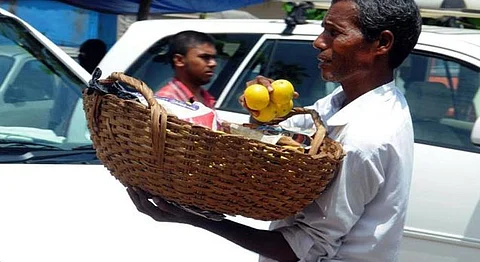
- #HGCREATORS
- #HGEXPLORE
- #HGVOICES
- #HGSHOP
- CAREERS
- ABOUT US
- CONTACT US

For the people of Newpadupu village, near Mangalore, Harekala Hajabba is no ordinary person. A man who cannot read nor write his own name without some help, it is thanks to this fruit-seller’s undeterred determination that the children of the village have a school to go to, an opportunity that wasn’t available to him. It all started when the orange-seller was approached by two foreigners. "The first time I felt handicapped because of my lack of education was when a foreigner asked me the price of the fruits in English. I didn't not know what he meant," Hajabba told BBC. "An idea struck me to start a primary school so that the young children of my village would not go through a similar situation.” He then went on to spend the next thirty years and more saving his meagre wages to fund a school for the village children.
He started a small school in the local madarsa with twenty eight children, but it wasn’t enough. Constantly pursuing the local government for support, it was in 2000 that land was sanctioned and he finally got the chance to fulfill his dream. A small primary school was built, which he continued to fund himself, but he didn’t stop here. Wanting to upgrade the school to a full-fledged high school, he spent the next few years asking anyone and everyone he came across for funding, and it was with the help of philanthropists and support from the government that the Dakshina Kannada Zila Panchayat Higher Primary School, also known as Hajabba School, was inaugurated in 2014.
“My name is Nazir and I am studying in the ninth” says a young man to CNN IBN. “If not for the school, my son would have been a labourer like his father,” says his mother as Najir says “I want to become an engineer,” smilingly. Hajabba made many sacrifices through his journey as harbinger of rural education, and his family has had to make cutbacks in order to fulfill his dream. "He earned very little to even dream of starting a school. But, his determination to educate others drove him towards success. In a country like India where education is not the primary goal for many rural families, Mr Hajabba is a shining light," Mr. Thufail Muhammad, a senior journalist at The Hindu says talking to BBC.

A humble man, he never asked for anything in return. Having spent most of his life savings in the maintenance of the school he couldn’t afford to repair his own house. While he was admitted into hospital for ill health, his son reached out to Alban Menezes, president of the Union Christian Association (UCA), informing him of his family’s dire situation. Menezes and members of UCA came together and gifted Hajabba a house. “I never dreamt of living in a house worth Rs 15 lakh in my life. Today, I am extremely happy, thankful and I pray for the well-being of the donors who built me a house,” says an overwhelmed Hajabba.
Affectionately known as ‘Akshara Santa,’ the saint of letters, social activist and writer Ismath Pajeer published a book on Hajabba’s achievements titled Harekala Hajabbara Jeevana Charitre, the life story of Harekala Hajabba, which was been included in the syllabus of Mangalore University. He was named Person Of The Year by local newspaper Kannada Prabha, and he was also given the Real Heroes award by CNN IBN and Reliance Foundation. "The award consisted of a purse of 100,000 rupees. People started sending in donations, irrespective of their caste or religion, and congratulated me. Until then, I was an unknown person," Hajabba says.
"In which school can you find the development and monitoring committee vice-chairman [Hajabba's official title] sweeping the floor? He does not have a chair of his own in the school," comments the school headmistress Veena GH. Despite his acquired fame and well-deserved awards, Hajabba continues to sell oranges and live a simple life, with the next goal in sight, that of opening a college in the village. “There are many girl children who stop going to college after finishing their SSLC [Secondary School Leaving Certificate]. Most of these kids go back to rolling beedis till they get married," says Hajabba speaking to the Deccan Chronicle. “The colleges are located far from our village and mostly these children cannot afford to pay the fees. We are hoping to begin a pre university college with the help of government so that the girl students who now discontinue education at SSLC could come here and study,” he adds. Hajabba wants a brighter future for the children of his village, one that he could not have and we applaud the extraordinary work and generosity of this far from ordinary man.
Feature image courtesy The Hindu
Words: Sara Hussain
